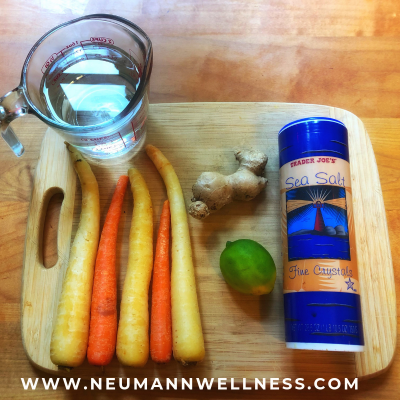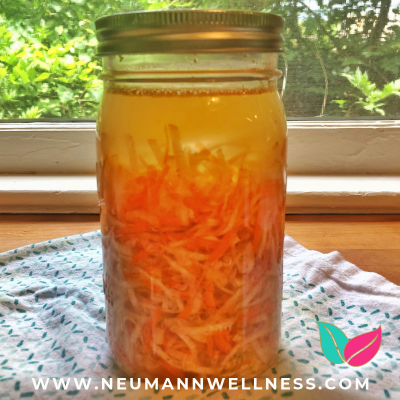Boost your gut health and save money: how to ferment your own foods!

DID YOU KNOW?
From kimchi in Korea to sauerkraut in Germany, the process of fermenting foods is as old as humanity, with its origins dating back thousands of years. Unfortunately, fermented foods have largely disappeared from the Western diet, and with MUCH detriment to our gut health.
Like it or not, fermentation is everywhere and it’s an everyday miracle. Microscopic bacteria are essential to life’s processes allowing us to digest food into nutrients, protecting us from dangerous organisms, and helping our immune systems to function optimally.
WHAT IS FERMENTATION?
In the process of fermentation, bacteria or yeast convert carbohydrates into alcohol or lactic acid under anaerobic (aka without oxygen) conditions.
We won’t be diving into alcoholic fermentation because for those of you dealing with digestive issues this could add more problems than benefit. When I talk about fermentation, I’m mostly talking about the lactic acid kind (think fermented vegetables and the like).
WHY EAT FERMENTED FOODS?
Your gut microbiome is made up of 100 TRILLION or so bacteria and microorganisms. Research has linked these tiny creatures to all sorts of health issues, with everything from digestive issues to neurodegenerative diseases and in between.
In short, fermented foods are a powerful aid to digestion and a great way to put your gut back into balance. Why?
First, fermentation serves to enhance the digestion of the foods you eat. It makes nutrients more bioavailable by providing enzymes to properly absorb, digest and utilize nutrients in foods.
For example, lactose (a sugar found in milk) is broken down during fermentation into simpler sugars, glucose and galactose.
This process allows those who struggle with lactose intolerance to consume fermented dairy products (like kefir and yogurt) without experiencing digestive discomfort normally seen when consuming non-fermented dairy products such as regular milk.
Second, fermented foods are filled with TONS of beneficial bacteria that work to reinforce the good bacteria that already exist in your gut. They basically help keep proper balance between the good and bad guys living in your gut!
Third, fermented foods help boost your immune health. Did you know that about 80% of your immune system resides in your gut? Nurturing your guts’ immune health helps keep your intestinal tract healthy and in tune.
WHY MAKE YOUR OWN FERMENTED FOODS?
First off, adding a small amount of fermented food to each meal will give you your biggest bang for your buck. Why? Because they can contain a greater QUANTITY and greater VARIETY of beneficial bacteria than some probiotic supplements out there in the market. Not to mention they’re a lot cheaper than the ferments you buy at your local grocery store.
Second, making your own ferments ensures the ingredients you add to it are tolerable for you specifically. Most commercial ferments out there, such as pickles, have added ingredients such as garlic, onions, and other spices that often act as triggers for those struggling with digestive issues.
Third, not all commercially fermented foods are created equal. The jars of pickles you buy off the shelf at the supermarket are sometimes pickled using just vinegar and NOT with the live organisms that exert the health benefits as discussed above. If you DO opt to purchase ferments be sure the label states “naturally fermented” to get the most benefit.
Finally, as Sandoor Katz, author of Wild Fermentation: the flavor, nutrition, and craft of live-culture foods states: “Do-it-yourself is an ethic that is practiced by many people. It is an attitude of self-empowerment and openness to learning.”
Making your own ferments is a source of empowerment and it gets your creative juices flowing. Fermentation is really an art, you can ferment nearly anything and be as creative as you want!
So why not uplevel your health (and creativity) starting in your very own kitchen?
HOW TO GET STARTED.
Here’s a few important tips to get you started!
Choose Quality Produce.
Non-organic produce is sprayed with pesticides and kill of any beneficial bacteria before even making it to the grocery store shelf. Bonus points for those who choose organic or locally grown produce as their ferment base!
Use the Right Tools.
This is the most important piece. To get started, you’ll want to make sure you have the following tools:
- Food processor with shred blade or box grater
- Mason jars
- Fermentation weights
- Microplane or box grater
- Lemon press (optional)
- Cutting board & knife
- Bowl

Get Started with an Easy Recipe.
This Ginger-Lime Carrot Ferment is a quick and easy recipe to get you started on your fermentation journey.
Ingredients:

Final Product:

Here’s a printable recipe below:

Ginger-Lime Fermented Carrots
Equipment
- Mason Jar
- Food Processor or Box Grater
- Knife
- Cutting Board
- Microplane or Box Grater
- Lemon Press (optional)
- Bowl to mix ingredients
- Saucepan to boil water
- Fermentation weight or ramekin that fits inside your mason jar
Ingredients
- 4-5 medium sized organic multicolored carrots washed, but not peeled
- 1 large lime zest and juice
- 1 Tbsp fresh ginger, grated
- 1 1/2 tsp unrefined sea salt
- 2 cups filtered water
Instructions
- Wash your hands, containers, knife, cutting board, food processor, and other tools in hot soapy water. Let air dry. Rinse the carrots and limes in cool water, let air dry.
- Using the shred setting on your food processor (or a box grater), grate the carrots and transfer into a bowl.
- Peel ginger and grate into carrots. You can use a microplane or box grater. Mix well.
- Zest the limes into carrot mixture. Squeeze lime juice over carrots, extracting as much juice as possible. A hand-held lemon press works great here! Mix well.
- In a clean saucepan, bring 1 cup of the filtered water to a boil and dissolve the salt into the hot water and allow to cool. Add 1 cup of room temp or cold filtered water to this mixture. Stir with a clean spoon to combine and let cool.
- Add the carrot mixture to your clean mason jar, packing them down tightly. Cover with the salt water brine, leaving at least 1/2" of space (you may have extra water leftover).
- Place a clean fermentation weight on top of the carrots. All pieces of the carrot mixture must be submerged under water to avoid mold growth. Remember: fermentation happens in anaerobic conditions (aka without oxygen) so it's important to completely submerge the thing you're trying to ferment!
- Cover the mason jar loosely with a clean towel or place the lid loosely on top of the jar. You want the beneficial bugs to be able to get in there, so don't close it too tight.
- Store your jar at room temperature on a dark shelf or out of direct light (if you're covering the lid with a towel, that works too!). Be sure you put it in a place where you won't forget about it.
- After 3 days your carrots should be fermented. If you prefer more tanginess, allow them to continue to ferment longer. Be sure to taste using a clean utensil.
- When you're satisfied with the flavor, tighten the lid on your mason jar and refrigerate. It should keep about 9 months. Add as a side to all of your favorite meals!
Notes
- It’s super important to use filtered water as regular tap water contains chlorine that can kill off beneficial bacteria.
- Expect your carrots to change color. Some will brighten and others will become dull in color. The liquid will likely become cloudy as well, this is normal. You might see white mold on top, this is normal too! The good bacteria are doing their job. If it bothers you, just scoop it off using a clean utensil.
- Ginger promotes digestion by stimulating hydrochloric acid from the stomach and bile from the liver. It also supports gut health by reshaping the microbiome favorably and controlling overgrowth of opportunistic microbes.
- Lime zest contains d-limonene which is great for gallbladder health and aids in liver and hormone detoxification.
Now try it out for yourself!
Now you’re on your way to becoming a fermentation pro! Adding a small serving of ferments daily will help supercharge your gut health, boost immunity, and improve nutrient bioavailability.
I hope you’ll give it a try!
Are you struggling with gut issues?
Are you ready to have the energy to enjoy a beautiful hike? To channel calm-as-a-cucumber serenity each day and to have a belly that finally behaves? Let’s chat!
Now is the time to book your free clarity call so that we can talk all about you, and your symptom-free future.

